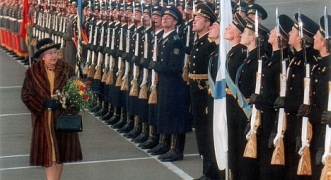Thatcher: Russia says goodbye to the Iron Lady

Flowers placed by well-wishers surround a portrait of former British Prime Minister Margaret Thatcher outside her home in Belgravia, London.Thatcher died Monday at 87 on April 8. Source: AP
On Monday, former British Prime Minister Margaret Thatcher died at the age of 87. According to the recollections of those who knew the Iron Lady personally, she fully lived up to her sobriquet: strong, decisive, charismatic.
In March 1987, Thatcher gave a television interview with Soviet journalists Tomas Kolesnichenko, Vladimir Simonov, and Boris Kalyagin, which was broadcast on the USSR’s central network.
"Her interview with Soviet political observers, which happened to be the first live TV interview with a politician outside the Soviet bloc, sent shockwaves around people's living rooms," says Russian journalist Alexander Arkhangelsky. "Nowadays, we are accustomed to Western leaders' answers being abrupt, unconstrained, and breezy, but back then it was like something from the moon or Mars."
Political analyst for Soviet TV and radio Boris Kalyagin recalls the conversation with warmth. In the commotion of the Soviet and British crews jockeying for position around the British prime minister before filming, a large vase was knocked over.
"There was no water, only some plants. But Thatcher didn't get angry with anyone, just smiled sweetly, and joked about it. She was a very interesting woman: she could say unpleasant things, but did so always with a charming smile on her lips. It wasn't offensive," the journalist shares his recollections with RBTH.
He says that just before the interview, the Central Committee of the Communist Party issued instructions to "catch" Thatcher on the question of nuclear weapons.
"It was a rotten start — how can you 'catch' the prime minister if she doesn't want to talk about it? A couple of sharp retorts made her position clear — the UK was not going to abandon nuclear weapons. She suggested that no more be said about it. Thatcher put her foot down, and came out on top. She performed admirably in the interview," continues Kalyagin.
"She was absolutely honest and principled, and could not be swayed at all. I've never met anyone like her," recalls former Deputy Prime Minister of Russia Boris Nemtsov, who was acquainted with Thatcher for many years. "She believed in private property, in the rule of law, in democracy, and did not believe in the power of the state."
Russian opposition politician Vladimir Ryzhkov, who also met Thatcher on several occasions, backs up these impressions: "She had very strong human charisma, and immediately drew attention to herself. It was not even related to her position as prime minister. She simply emanated imperiousness and personal strength. Although physically fragile, her keen and penetrating gaze, famous coiffure, and confident bearing all spoke of power."
Russian politicians also pay tribute to Thatcher's political significance.
"She transformed the UK. Before Mrs Thatcher, it was a socialist country overburdened by social spending and the public sector, with unemployment and runaway inflation. Britain was sinking in the 1970s. The prime minister effectively performed a surgical operation on the British economy, cut social spending, and turned London into a global financial center. The Britain we know today is her creation," asserts Ryzhkov.
Commentators also admire Thatcher's tough stance in the war between Britain and Argentina over the Falkland Islands in 1982.
For the Soviet Union and later Russia, Thatcher did indeed have a soft spot, says Nemtsov. "She had a keen interest in Russian life. She said that the two countries shared an imperial past, but whereas Britain had managed to overcome its post-imperial complex, for Russia it was just beginning."
Thatcher, says Ryzhkov, was the first world leader to offer unconditional support to Mikhail Gorbachev during perestroika, thereby demonstrating her political acumen. It was her assessment that guaranteed the West's support of the changes taking place in the Soviet Union, which helped end the Cold War and the arms race.
"She was the first to see the leader in Gorbachev. And uttered the famous words: ‘This is a man I can do business with,’” confirms journalist Kalyagin.
Margaret Thatcher talking with Mikhail Gorbachev about Nuclear Weapons. Source: YouTube
However, not all have a positive view of the impact that Thatcher had on the first and last president of the Soviet Union.
"As one of the major political figures of the late 20th century, alongside Ronald Reagan, Thatcher stated that the West was right to compete with the Soviet Union and to fight against the communist regime. That is the position from which she aligned her relationship with Gorbachev.
And Gorbachev acquiesced to her far more often than she to him. Therefore, her contribution to the collapse of the Soviet Union was very great indeed," says historian and political scientist Vyacheslav Nikonov, adding that his assessment of the collapse of the USSR is negative.
All rights reserved by Rossiyskaya Gazeta.
Subscribe
to our newsletter!
Get the week's best stories straight to your inbox
